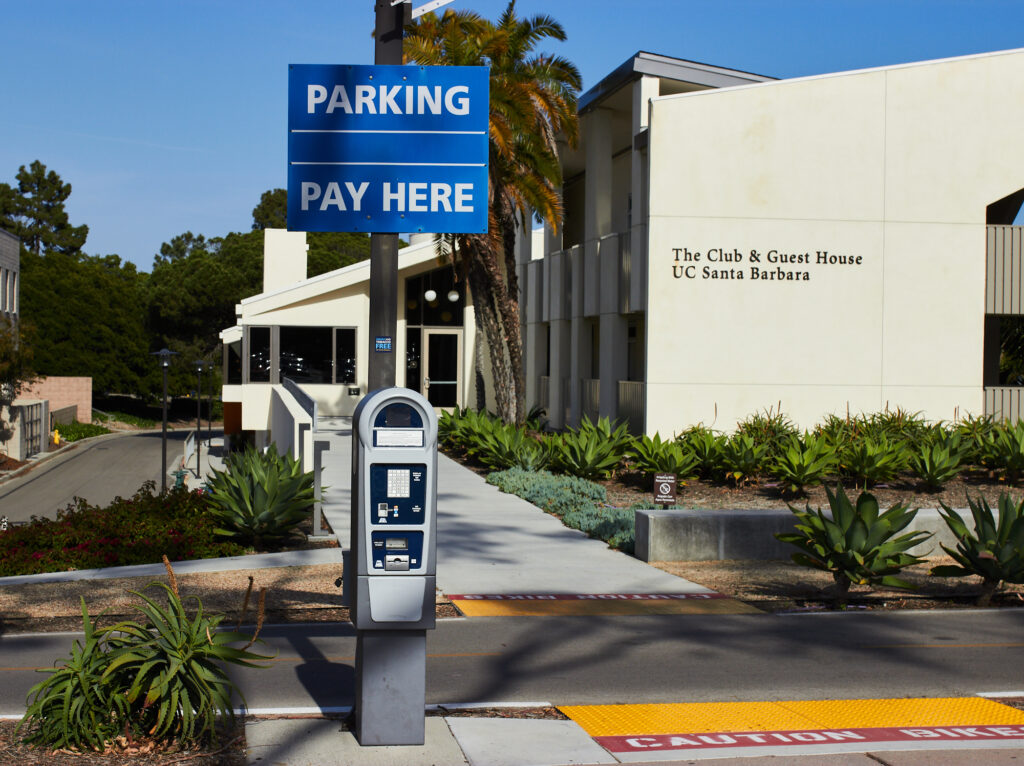After Transportation and Parking Services updated its policies to prohibit on-campus parking passes for first-years, several students cited their need for the permits, ranging from grocery store runs to visiting family.

Transportation and Parking Services attributes new parking restrictions for first-year students to new housing project construction. Nexus File Photo
In March, Transportation and Parking Services (TPS) updated its policy for first-years, including those with sophomore credit status, due to limited parking spaces on campus.
TPS said the restriction comes as new housing projects will “impact” campus parking. The campus undertook an “extensive” review before updating its first-year policy, they said.
“The review concluded that the cost for a new parking structure was prohibitive, that UC Santa Barbara was the only UC campus that did not already restrict parking for first-year students,” an email statement from TPS read. “Our campus has many cost-effective and sustainable modes of transportation available to our students.”
Most UCs restrict first-year parking to some capacity. Priority is given to upperclassmen at UC Los Angeles, UC Santa Cruz first-years cannot receive permits and undergraduate students at UC San Diego are generally not granted parking permits.
Several students voiced their concerns, citing how having a car on campus helped them in various ways.
First-year linguistics major Khloe Owen said that having a car has allowed her to get groceries and visit her home, where no direct flights arrive to.
“There’s not really an airport there, even if I wanted to, so it’s always kind of a mission,” Owen said. “It depends on what your situation is. For me, it was very helpful and very convenient.”
Fourth-year sociology and feminist studies double major Makaila Angevine had an on-campus parking pass her first year. Angevine said that their car also helps them get around as a student with a disability, going to doctor’s appointments and buying groceries with less difficulty than taking the bus.
“When I had a car, it was a lot easier for me to get my groceries up into the building, as well as helping out people similar to me, just my friends in general,” Angevine said. “It just feels very inconsiderate of students and their needs.”
Having a car also allowed Angevine to see her grandfather before he passed. They said having a car was more time-efficient than taking the train to her hometown.
“[My grandfather’s death] was kind of sudden. So I was literally told the day of, and I was able to go and see him before he passed,” Angevine said. “My parents would have not been able to pick me up, I would have had to go on a bus or schedule a trip, and I wouldn’t have [been] able to make it on time.”
First-year chemistry major Ian Maclachlan said having a car on campus has allowed him to go home whenever he wants and to spend more time with his grandparents, who he says are of old age. He said having a car has also given him more freedom, like going to different beaches to surf or to coffee shops for studying.
“I’ve been enjoying the freedoms more. The luxury of going out to surf in locations that are better than Campus Point is pretty awesome,” Maclachlan said. “It’s just a change of scenery. It feels like a breath of fresh air if you’re always on campus.”
Maclachlan said the prospects of finding parking in I.V. next year are “not looking good.”
“I’m still on the search for something reasonable and in kind of a better area, but you know, at a certain point I’m going to have to take what I can get,” Maclachlan said. “I’m kind of pigeon-toed here. There’s no safety net for it.”
First-year political science and dance double major Juliana Gallegos said that she did not receive an on-campus parking permit. Despite this, Gallegos still brought her car to campus. She uses her car “a couple of times a week” for grocery runs, returning home and personal leisure.
“One for my own personal use. I knew I’d be able to go to the store a lot and stuff like that,” Gallegos said. “I was also thinking ahead. What if there’s a natural disaster and I’m stuck here?”
Gallegos said she appreciates the feeling of “access” her car gives her, especially considering she is an out-of-state student.
“As an out-of-state person, there’s something like comfort. Being so far away from home, my car is like my safety net,” Gallegos said.
A version of this article appeared on p. _3 of the May 15, 2025 print edition of the Daily Nexus.





















Too many students.